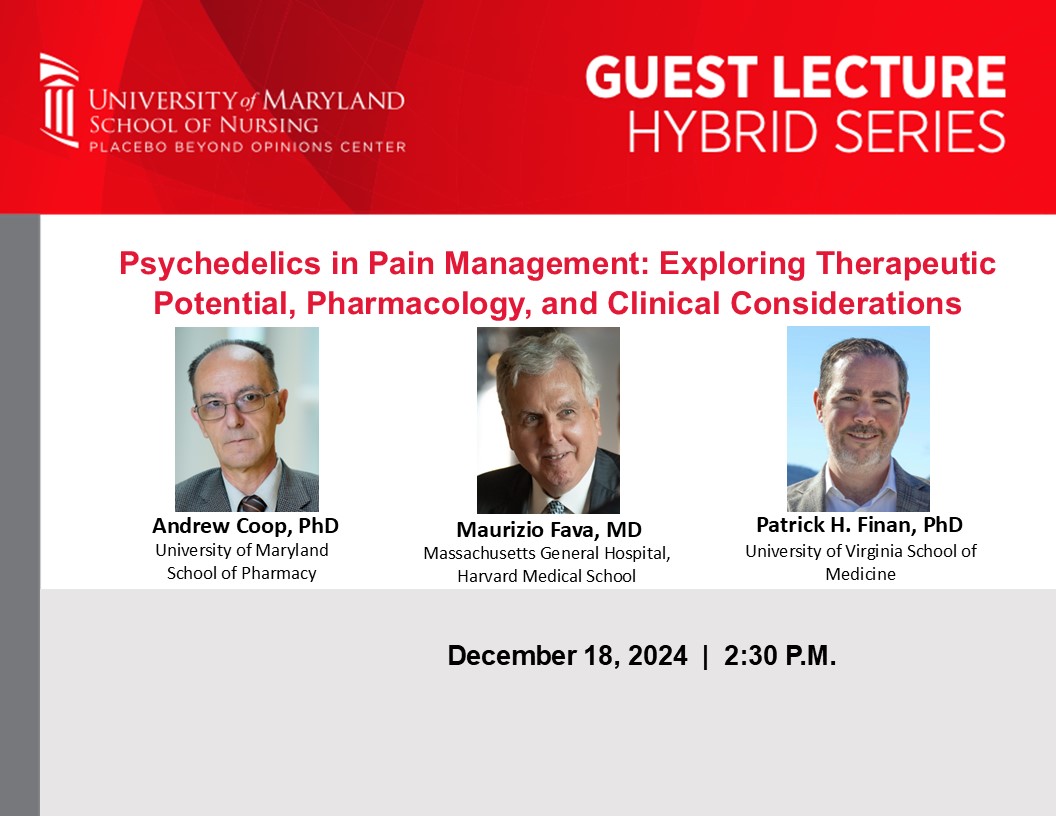Events
Past Events
2025-2026 Lecture Series

| Date | Topic | Speaker |
|---|---|---|
| Dec. 16, 2025 |
Placebo and the Body: Psychobiological Pathways of Healing |
Karin Meissner, MD, PhD
|
2024-2025 Lecture Series

| Date | Topic | Speaker |
|---|---|---|
| May 15, 2025 |
Innovative Approaches for the Treatment of Chronic Pain in Youth |
Laura E. Simons, PhD
|
| March 24, 2025 |
Challenges in Design and Interpretation |
Steven P. Cohen, MD |
| March 13, 2025 |
The Contribution of Endocannabinoids
|
Massieh Moayedi, PhD
|
Psychedelics in Pain Management Panel
This was the first session of the 2024-25 Guest Lecture Hybrid Series. The panel entitled Psychedelics in Pain Management: Exploring Therapeutic Potential, Pharmacology, and Clinical Considerations, featured three scholars on the pharmacology of psychedelic agents and their applications in pain management and mood disorders.

Read "What should constitute a control condition in psychedelic drug trials?" from Nature Mental Health by Luana Colloca and Maurizio Fava.
Andy Coop, PhD, works at the University of Maryland School of Pharmacy. He is a Professor of Pharmaceutical Sciences and the Associate Dean of Graduate Programs. He received his PhD from the University of Bristol in chemistry of drugs of abuse, followed by a Fogerty post-doctoral fellowship at the National Institutes of Health. His research focuses on the design and synthesis of novel opioids as well as elucidating the influence of the cholinergic system on major depression, with funding received from NIMH, NIDA, National Cancer Institute, and other state and federal sources. Dr. Coop has been appointed as the Chair of Maryland’s Task Force on the Responsible Use of Natural Psychedelic Substances, where he will shape policy around education and safety, regulated treatment, and production of natural psychedelic substances.
Maurizio Fava, MD, is the Chair, Mass General Brigham Academic Medical Centers Department of Psychiatry at Massachusetts General Hospital (MGH) and the Slater Family Professor of Psychiatry at Harvard Medical School. Dr. Fava obtained his MD from the University of Padova School of Medicine where he completed residency training in endocrinology. He completed residency training in psychiatry at Mass General. He founded the hospital’s Depression Clinical and Research Program (DCRP), then went on to establish the Mass General Psychiatry Clinical Trials Network and Institute (CTNI), the first academic CRO specialized in planning and coordination of multi-center clinical trials in psychiatry, where he continues to serve as Executive Director. Dr. Fava’s work has been supported by $95 million in funding from NIMH and other sources and includes his work as co-principal investigator of STAR*D, the largest research study ever conducted in depression.
Patrick Finan, PhD, is the Harold Carron Professor of Anesthesiology at the University of Virginia School of Medicine. His background is in psychology, with emphasis on the cognitive, behavioral, and affective mechanisms and treatments for chronic pain. He obtained his PhD in clinical psychology at Arizona State University. He continued his training with a clinical internship at the VA Medical Center, then did a postdoctoral fellowship at the Johns Hopkins School of Medicine. His research program at the University of Virginia is supported through numerous NIH grants, where his group performs studies using laboratory and psychotherapeutic interventions to prove mechanisms underlying chronic pain. A major focus of his research to date has centered on the measurement and analysis of dynamic measures of pain and emotion captured during daily life.
2023-2024 Lecture Series

| Date | Topic | Speaker |
|---|---|---|
| May 13, 2024 |
The Appetitive Side of Placebo Effects in Brain and Behavior
|
Liane Schmidt, PhD
In her current work at INSERM, she investigates how beliefs about oneself, the world and the future bias decision-making and motivation in health, depression or obesity. |
| May 5, 2024 |
Neural and Physiological Mechanisms Supporting Mindfulness-Based Analgesia as Compared to Placebo |
Fadel Zeidan, PhD
|
| March 25, 2024 |
An Embodied Approach to Symptom Perception |
Christopher Eccleston, PhD
Chris founded and directed the Bath Pain Management Unit from 1994-2008, including the first residential pediatric pain program. He consults internationally on new services and team training in pain management. From 2009-2019 he was psychology editor for the journal PAIN, and coordinating editor of Pain, Palliative and Supportive Care Cochrane Review Group. |
| Feb. 21, 2024 |
Resilience and Impact on Behavior and Outcomes |
Barbara Resnick, PhD, RN, CRNP, FAAN, FAANP She has over 40 years of clinical experience as a nurse practitioner across all settings of care. Her research program is focused on optimizing function and physical activity among older adults, exploring resilience and genetics on function and physical activity, and testing dissemination and implementation of interventions in real world settings. She currently has several R01s, with one focused on optimizing physical activity among hospitalized older adults living with dementia and the other testing the implementation of a Pain Management Clinical Practice Guideline in Nursing Homes. |
| Dec. 13, 2023 |
Translating the Science of Placebo into Medical Practice
|
Wayne Jonas, MD
|
2022-2023 Lecture Series

| Date | Topic | Speaker |
|---|---|---|
| June 15, 2023 |
The Experience of Pain and Emotion: Meeting of Body, Brain, and Mind |
Gadi Gilam is an assistant professor in the Institute of Biomedical and Oral Research, Faculty of Dental Medicine, Hebrew University of Jerusalem, Israel, where he has established the translational Social, Cognitive, and Affective Neuroscience (tSCAN) lab. The lab's primary research focuses on the causes, consequences, and prevention of human suffering related to affective states, such as pain and anger, as they manifest at the intersection of chronic pain and psychopathological conditions. To address these issues, the lab uses a combination of methods from cognitive neuroscience, experimental psychology, and health informatics, while integrating perspectives from emotion science, social psychology, and pain medicine |
| May 23, 2023 |
(Un)Learning Pain: Learning Mechanisms of Placebo Effects in Pain |
Przemyslaw Babel is a full professor of psychology at Jagiellonian University in Krakow, Poland, where he serves as the director of the Institute of Psychology, the chair of the Research Discipline Council for Psychology, and the head of the Pain Research Group. His research interests include placebo effects in pain, the memory of pain, and psychological factors affecting pain perception. Babel has co-authored nearly 100 scientific publications and over 100 popular science publications. In 2019, he was awarded the status of Fellow by the Association for Psychological Science for his sustained outstanding contributions to the science of psychology. |
| April 20, 2023 | Beyond the Barrier: Skin Cells Actively Participate in Pain |
Cheryl Stucky is the Marvin Wagner Endowed Chair at the Medical College of Wisconsin (MCW) where she is also Director of the Pain Division of the Neuroscience Research Center. Stucky's lab studies the molecular, cellular and physiological mechanisms of sensation, particularly how we sense touch and pain in the normal, healthy state and in conditions of tissue injury or disease. |
| March 30, 2023 | Neural Pathways, Biomarkers, and Interventions |
Tor Wager is the Diana L. Taylor Distinguished Professor in Neuroscience at Dartmouth College, and the Director of Dartmouth’s Cognitive and Affective Neuroscience laboratory, the Dartmouth Brain Imaging Center, and the Dartmouth Center for Cognitive Neuroscience. Professor Wager’s research centers on the neurophysiology of affective processes—pain, emotion, stress, and empathy—and how they are shaped by cognitive and social influences. More information about Dr. Wager and his lab’s activities, publications, and software can be found at http://canlab.science. |
Society for Interdisciplinary Placebo Studies (SIPS) 2021 International Conference
SIPS 2021 Conference

The Third International Conference of the Society for Interdisciplinary Placebo Studies (SIPS): Integrating Current Knowledge on Placebo Research in Pain, Alcohol Use Disorders, and Other Substances Use Disorders was held on May 26, 2021.
The Society for Interdisciplinary Placebo Studies (SIPS) held its 3rd international conference virtually at the University of Maryland, Baltimore, USA (UMB) in May 2021. SIPS was created in 2014, with the mission of promoting interdisciplinary investigation of placebo and nocebo phenomena. The conference was designed to advance placebo research and the application of mind-body mechanisms to the management of alcohol/substance use and pain disorders. Pain and alcohol/substance use disorders are inter-related conditions with large and individually variable placebo effects on disease progression and response to treatments. In double-blind clinical trials for pain and alcohol use disorders, the responses to placebos can be as large as the active treatments leading to a stagnant era for the development of new drugs. The conference provided a collaborative platform to over 480 scientists worldwide including trainees, junior faculty, and healthcare professionals to (1) present and share innovative research findings and theoretical ideas on placebo research, (2) obtain training and education, and (3) advocate for the participation of minorities and women while expanding the U.S. research in the global network of placebo research. The presentations encompassed basic, translational, and clinical research delivered in 8 plenary sessions, 21 workshops, three spotlight sessions on timely topics.
 Meissner is a professor of Integrative Medicine at Coburg University of Applied Sciences and Arts in Germany. Her research bridges placebo science, psychobiology, and mind-body interventions, with a particular focus on the contextual and embodied mechanisms of healing. Meissner's work investigates how expectation, interoception, and body-based practices influence physiological and psychological outcomes in conditions such as pain, nausea, and appetite regulation. Her studies include experimental and clinical trials on open-label placebos, somatic placebo interventions, and psychobiological sex differences in placebo responses. With more than 100 publications, Meissner's work promotes an integrative, evidence-based understanding of how mind and body interact in healing.
Meissner is a professor of Integrative Medicine at Coburg University of Applied Sciences and Arts in Germany. Her research bridges placebo science, psychobiology, and mind-body interventions, with a particular focus on the contextual and embodied mechanisms of healing. Meissner's work investigates how expectation, interoception, and body-based practices influence physiological and psychological outcomes in conditions such as pain, nausea, and appetite regulation. Her studies include experimental and clinical trials on open-label placebos, somatic placebo interventions, and psychobiological sex differences in placebo responses. With more than 100 publications, Meissner's work promotes an integrative, evidence-based understanding of how mind and body interact in healing. Simons is a professor in the Department of Anesthesiology, Perioperative, and Pain Medicine at Stanford University School of Medicine and an attending psychologist at the pediatric pain management clinic at Stanford Children’s Health. Simons is a committed researcher and clinician with a focus on psychological assessment and development of treatment interventions to improve the lives of youth with chronic pain. Prior to joining Stanford in 2016, she was an attending psychologist/associate professor at Boston Children’s Hospital/Harvard Medical School. Over the decade she spent at BCH she worked in the chronic pain clinic, pediatric headache program, and pediatric pain rehabilitation center (PPRC).
Simons is a professor in the Department of Anesthesiology, Perioperative, and Pain Medicine at Stanford University School of Medicine and an attending psychologist at the pediatric pain management clinic at Stanford Children’s Health. Simons is a committed researcher and clinician with a focus on psychological assessment and development of treatment interventions to improve the lives of youth with chronic pain. Prior to joining Stanford in 2016, she was an attending psychologist/associate professor at Boston Children’s Hospital/Harvard Medical School. Over the decade she spent at BCH she worked in the chronic pain clinic, pediatric headache program, and pediatric pain rehabilitation center (PPRC). Steven Cohen earned his medical degree from Mount Sinai, followed by an anesthesiology residency at Columbia University and a pain fellowship at Massachusetts General Hospital. A retired U.S. Army Colonel, he deployed four times in support of operations in Bosnia, Iraq, and Afghanistan. Currently, Cohen is the inaugural Edmond I. Eger Professor of Anesthesiology, Vice Chair of Research and Pain Medicine, and a Professor across multiple disciplines at Northwestern University Feinberg School of Medicine. He also serves as Director of Pain Research and Professor at Walter Reed National Military Medical Center and the Uniformed Services University of the Health Sciences. Previously, he held faculty positions at Johns Hopkins School of Medicine. Cohen’s groundbreaking research has been published in top medical journals, including The Lancet, Annals of Internal Medicine, JAMA, and The New England Journal of Medicine. From 2021 to 2023, ExpertScape ranked him as the No. 1 or No. 2 chronic pain expert globally. He is the Principal Investigator on the largest NIH HEAL study and multiple federally funded multicenter trials. Beyond his research, Cohen is the President-Elect of ASRA-Pain Medicine, the largest pain organization in the U.S.
Steven Cohen earned his medical degree from Mount Sinai, followed by an anesthesiology residency at Columbia University and a pain fellowship at Massachusetts General Hospital. A retired U.S. Army Colonel, he deployed four times in support of operations in Bosnia, Iraq, and Afghanistan. Currently, Cohen is the inaugural Edmond I. Eger Professor of Anesthesiology, Vice Chair of Research and Pain Medicine, and a Professor across multiple disciplines at Northwestern University Feinberg School of Medicine. He also serves as Director of Pain Research and Professor at Walter Reed National Military Medical Center and the Uniformed Services University of the Health Sciences. Previously, he held faculty positions at Johns Hopkins School of Medicine. Cohen’s groundbreaking research has been published in top medical journals, including The Lancet, Annals of Internal Medicine, JAMA, and The New England Journal of Medicine. From 2021 to 2023, ExpertScape ranked him as the No. 1 or No. 2 chronic pain expert globally. He is the Principal Investigator on the largest NIH HEAL study and multiple federally funded multicenter trials. Beyond his research, Cohen is the President-Elect of ASRA-Pain Medicine, the largest pain organization in the U.S. Massieh Moayedi
Massieh Moayedi  Liane Schmidt is a faculty member at INSERM in Paris, France. She earned her PhD at the Pierre et Marie Curie Paris VI University in France, for her investigation of the neuropsychological determinants of incentive motivation in humans. Her scientific background stems from the cognitive neurosciences.
Liane Schmidt is a faculty member at INSERM in Paris, France. She earned her PhD at the Pierre et Marie Curie Paris VI University in France, for her investigation of the neuropsychological determinants of incentive motivation in humans. Her scientific background stems from the cognitive neurosciences.  Fadel Zeidan is an associate professor in the Department of Anesthesiology and director of the Pain Health and Mindfulness Laboratory. He is also a co-founder and Neuroscience Director for the UC San Diego Center for Psychedelic Research. Zeidan’s current research is focused on determining the psychological, physiological and neural mechanisms that mediate the relationship between self-regulatory practices and health. Fadel’s work examines the mechanisms of action supporting mindfulness meditation, psychedelics, cannabis on pain. To date, he and his team have demonstrated that mindfulness meditation is mechanistically distinct from and more effective than placebo, distraction, and relaxation.
Fadel Zeidan is an associate professor in the Department of Anesthesiology and director of the Pain Health and Mindfulness Laboratory. He is also a co-founder and Neuroscience Director for the UC San Diego Center for Psychedelic Research. Zeidan’s current research is focused on determining the psychological, physiological and neural mechanisms that mediate the relationship between self-regulatory practices and health. Fadel’s work examines the mechanisms of action supporting mindfulness meditation, psychedelics, cannabis on pain. To date, he and his team have demonstrated that mindfulness meditation is mechanistically distinct from and more effective than placebo, distraction, and relaxation. 
 Barbara Resnick, PhD, RN, CRNP, FAAN, FAANP, is a professor, the associate dean for research, and the Sonya Ziporkin Gershowitz Chair in Gerontology at UMSON.
Barbara Resnick, PhD, RN, CRNP, FAAN, FAANP, is a professor, the associate dean for research, and the Sonya Ziporkin Gershowitz Chair in Gerontology at UMSON.
 Wayne Jonas, MD, is a widely published investigator, practicing family physician, and professor of medicine at Georgetown University and at Uniformed Services University of Health Sciences. He is also a retired lieutenant colonel in the Medical Corps of the United States Army. Dr. Jonas was the director of the Office of Alternative Medicine at the National Institutes of Health from 1995 to 1999 and led the World Health Organization’s Collaborative Center for Traditional Medicine. Prior to that, he served as the director of medical research fellowship at the Walter Reed Army Institute of Research. He now advises national and international organizations on ways to implement evidence-based healing practices in their medical systems. He serves as the president of the Healing Works Foundation.
Wayne Jonas, MD, is a widely published investigator, practicing family physician, and professor of medicine at Georgetown University and at Uniformed Services University of Health Sciences. He is also a retired lieutenant colonel in the Medical Corps of the United States Army. Dr. Jonas was the director of the Office of Alternative Medicine at the National Institutes of Health from 1995 to 1999 and led the World Health Organization’s Collaborative Center for Traditional Medicine. Prior to that, he served as the director of medical research fellowship at the Walter Reed Army Institute of Research. He now advises national and international organizations on ways to implement evidence-based healing practices in their medical systems. He serves as the president of the Healing Works Foundation. Gadi Gilam, PhD
Gadi Gilam, PhD Przemyslaw Babel, PhD
Przemyslaw Babel, PhD Cheryl Stucky, PhD
Cheryl Stucky, PhD Tor Wager, PhD
Tor Wager, PhD